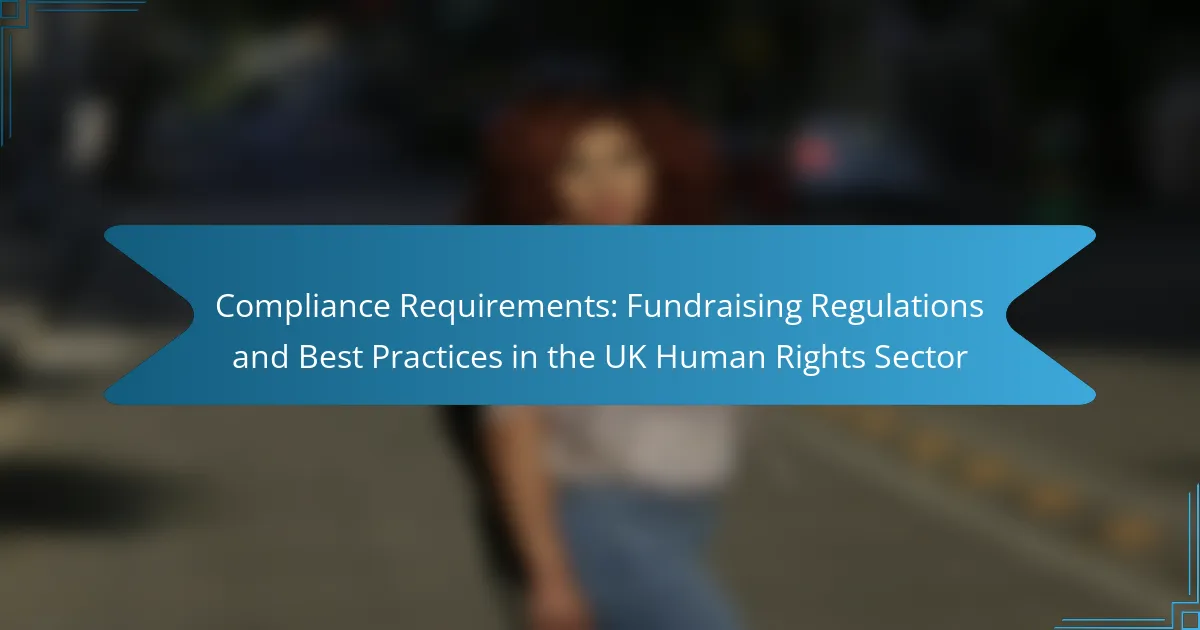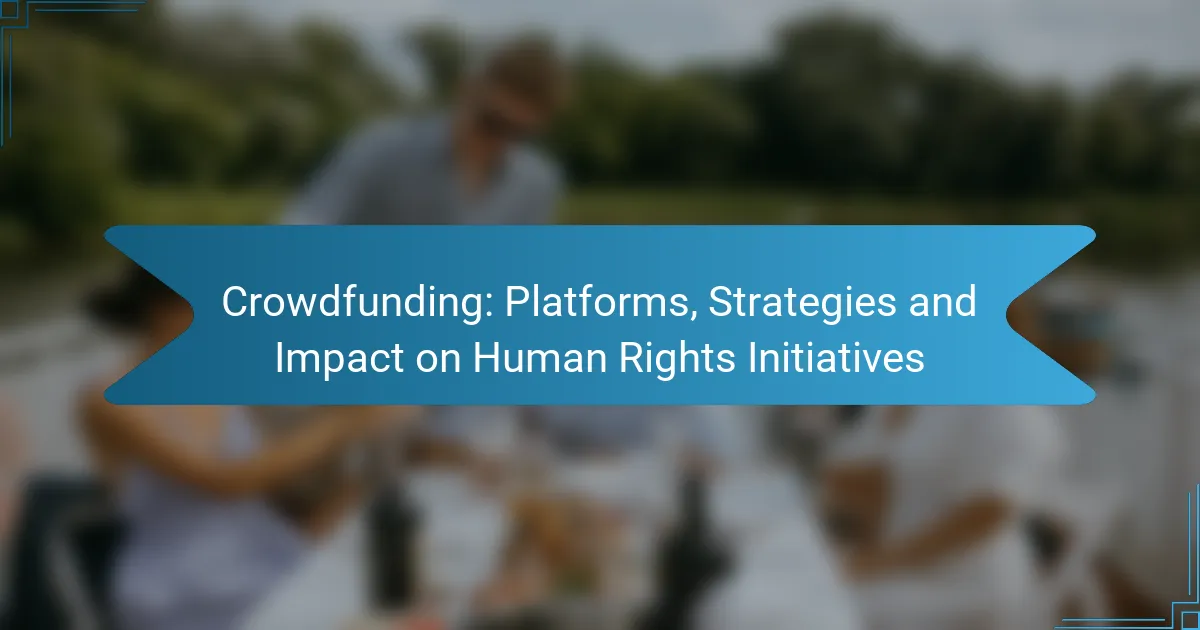In the UK human rights sector, compliance with fundraising regulations is crucial for maintaining transparency and trust. Organizations must adhere to guidelines from the Charity Commission and the Fundraising Standards Board, while also ensuring compliance with data protection and financial conduct laws. Implementing systematic practices and best practices in ethics and donor engagement can significantly enhance fundraising effectiveness.
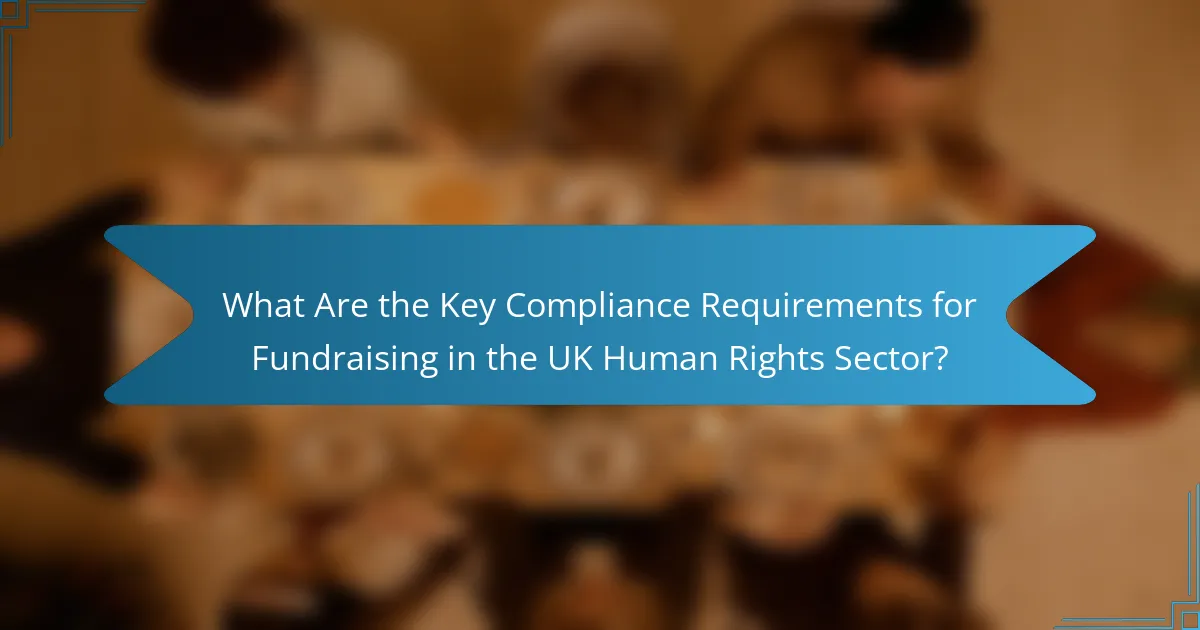
What Are the Key Compliance Requirements for Fundraising in the UK Human Rights Sector?
Key compliance requirements for fundraising in the UK human rights sector include adhering to regulations set by the Charity Commission, following guidelines from the Fundraising Standards Board, and ensuring data protection and financial conduct compliance. Organizations must also navigate tax regulations related to charitable donations to maintain transparency and trust.
Charity Commission Regulations
The Charity Commission oversees charities in England and Wales, ensuring they operate within legal frameworks. Fundraising activities must align with the charity’s objectives and comply with the Charities Act, which includes maintaining accurate records and submitting annual reports. Noncompliance can lead to penalties or loss of charitable status.
Charities should regularly review their fundraising practices to ensure they meet the Commission’s standards, which include transparency in fundraising costs and clear communication of how donations will be used. Engaging with stakeholders and beneficiaries can enhance compliance and public trust.
Fundraising Standards Board Guidelines
The Fundraising Standards Board (FSB) provides a framework for ethical fundraising practices. Charities are encouraged to adhere to the Code of Fundraising Practice, which emphasizes respect for donors, transparency, and accountability. Following these guidelines helps build trust and credibility with the public.
Organizations should train their staff and volunteers on these standards to ensure consistent application in all fundraising efforts. Regular audits of fundraising practices can help identify areas for improvement and ensure adherence to FSB guidelines.
Data Protection Act Compliance
Compliance with the Data Protection Act is crucial for charities handling personal data during fundraising. Organizations must ensure they collect, store, and process donor information lawfully and transparently. This includes obtaining consent for data usage and providing donors with clear information on how their data will be used.
Charities should implement robust data protection policies and conduct regular training for staff on data handling practices. Failure to comply can result in significant fines and damage to the charity’s reputation.
Financial Conduct Authority Rules
The Financial Conduct Authority (FCA) regulates certain fundraising activities, particularly those involving financial products or services. Charities must ensure that any fundraising that involves investments or financial transactions complies with FCA rules. This includes providing clear information about risks and ensuring that fundraising practices are fair and transparent.
Organizations should seek legal advice if unsure about FCA regulations related to their fundraising activities. Regular reviews of fundraising strategies can help ensure compliance and mitigate risks associated with financial misconduct.
Tax Regulations for Charitable Donations
Understanding tax regulations is essential for charities to maximize the benefits of donations. In the UK, Gift Aid allows charities to claim back a percentage of donations made by UK taxpayers, increasing the value of contributions. Charities must ensure they provide donors with the necessary information to claim Gift Aid.
Organizations should maintain accurate records of donations and ensure compliance with HM Revenue and Customs (HMRC) guidelines. Regular training on tax regulations can help staff navigate these complexities and optimize fundraising efforts.
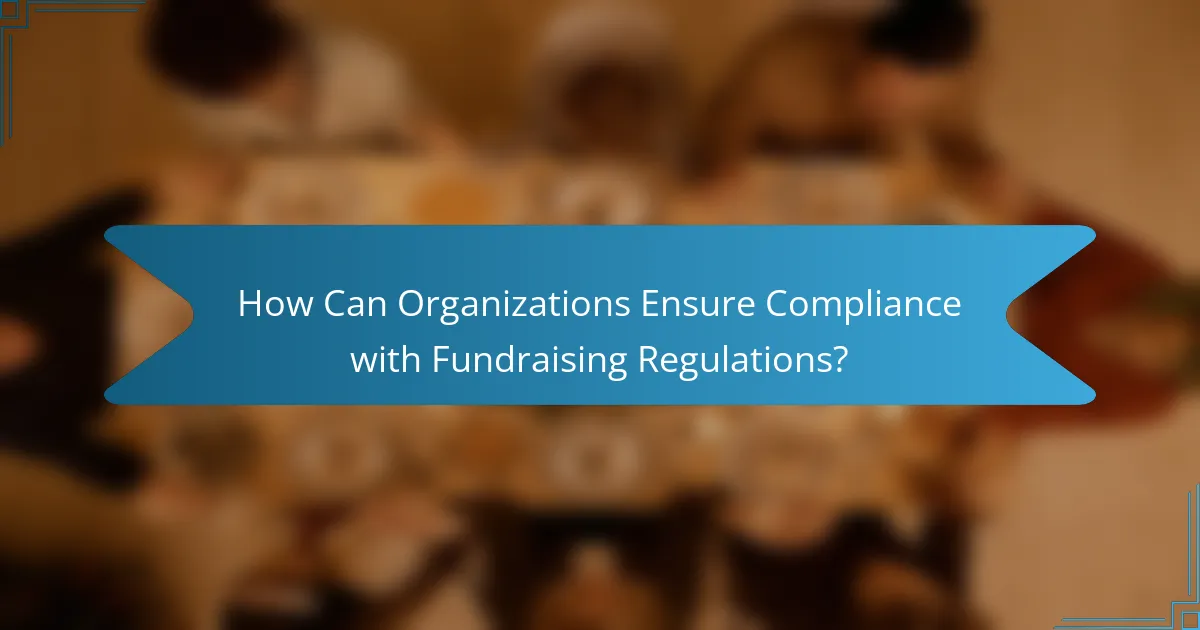
How Can Organizations Ensure Compliance with Fundraising Regulations?
Organizations can ensure compliance with fundraising regulations by implementing systematic practices that align with legal requirements and ethical standards. This involves regular training, thorough checklists, internal audits, and seeking legal advice to navigate the complexities of fundraising laws in the UK.
Regular Training for Staff
Regular training for staff is essential to keep everyone informed about the latest fundraising regulations and best practices. Training sessions should cover topics such as data protection, ethical fundraising, and donor engagement strategies.
Consider scheduling training at least once a year, with additional sessions for new hires or when regulations change. Engaging external experts can enhance the training experience and provide valuable insights.
Implementing Compliance Checklists
Compliance checklists serve as practical tools to ensure that all fundraising activities adhere to legal standards. These checklists should include key areas such as donor consent, transparency in financial reporting, and adherence to the Fundraising Regulator’s guidelines.
Organizations can create tailored checklists for different fundraising campaigns, allowing staff to easily track compliance at every stage. Regularly updating these checklists in response to regulatory changes is crucial for ongoing adherence.
Conducting Internal Audits
Internal audits are a proactive way to assess compliance with fundraising regulations. These audits should evaluate fundraising practices, financial records, and adherence to established policies.
Conducting audits annually or bi-annually can help identify areas for improvement and ensure that the organization is operating within legal boundaries. Engaging an external auditor can provide an unbiased perspective on compliance status.
Utilizing Legal Consultation Services
Utilizing legal consultation services can significantly enhance an organization’s understanding of fundraising regulations. Legal experts can offer tailored advice on compliance issues and help navigate complex legal frameworks.
Organizations should consider establishing a relationship with a legal consultant who specializes in charity law. This can provide ongoing support and ensure that fundraising practices remain compliant with evolving regulations.

What Best Practices Should Be Followed in Fundraising?
Best practices in fundraising for the UK human rights sector focus on transparency, ethics, and donor engagement. Adhering to these practices not only builds trust but also enhances the effectiveness of fundraising efforts.
Transparent Financial Reporting
Transparent financial reporting is crucial for maintaining donor trust and compliance with regulations. Organizations should provide clear and accessible financial statements that outline income sources and expenditure, ideally on an annual basis.
Consider implementing a standardized format for reporting, such as the Charities Statement of Recommended Practice (SORP). This helps ensure consistency and clarity, making it easier for donors to understand how their contributions are used.
Ethical Fundraising Techniques
Ethical fundraising techniques involve respecting donor privacy and ensuring that fundraising methods do not exploit vulnerable populations. Organizations should adhere to the Fundraising Regulator’s Code of Fundraising Practice, which emphasizes honesty and integrity in all fundraising activities.
Additionally, avoid aggressive solicitation tactics. Instead, focus on building long-term relationships with donors through meaningful engagement and communication.
Engaging with Donors Responsively
Engaging with donors responsively means acknowledging their contributions and addressing their inquiries promptly. This can be achieved by sending personalized thank-you messages and providing regular updates on how donations are making an impact.
Establishing a feedback mechanism can also enhance donor relations. Encourage donors to share their thoughts and experiences, which can help improve fundraising strategies and build a sense of community.
Utilizing Digital Fundraising Platforms
Utilizing digital fundraising platforms can significantly expand reach and streamline the donation process. Platforms like JustGiving or GoFundMe allow organizations to create campaigns that are easily shareable across social media, increasing visibility and engagement.
When choosing a platform, consider transaction fees and user experience. Aim for platforms that offer low fees and intuitive interfaces to enhance donor satisfaction and maximize funds raised.

What Are the Consequences of Non-Compliance?
Non-compliance with fundraising regulations in the UK can lead to significant legal and financial repercussions for organizations in the human rights sector. These consequences can range from monetary penalties to reputational harm, ultimately affecting an organization’s ability to operate effectively.
Legal Penalties and Fines
Organizations that fail to adhere to fundraising regulations may face legal penalties and fines imposed by regulatory bodies such as the Charity Commission. These fines can vary widely, often reaching thousands of pounds depending on the severity of the violation.
For example, failing to register with the Charity Commission or not following proper fundraising practices can result in fines that may impact an organization’s financial stability. It is crucial for organizations to stay informed about current regulations to avoid these costly penalties.
Reputation Damage to Organizations
Non-compliance can severely damage an organization’s reputation, leading to a loss of trust among donors, beneficiaries, and the public. A tarnished reputation can hinder fundraising efforts and reduce overall support for the organization’s mission.
For instance, negative media coverage stemming from compliance failures can deter potential donors and volunteers. Organizations should prioritize transparency and ethical practices to maintain a positive public image and foster trust within their communities.
Loss of Charitable Status
In severe cases, non-compliance can result in the loss of charitable status, which is essential for tax relief and public funding. If an organization is found to be consistently non-compliant, the Charity Commission may revoke its charitable status, significantly impacting its operations.
Maintaining compliance is vital for organizations to retain their charitable status and the associated benefits. Regular audits and compliance checks can help ensure that all fundraising activities align with legal requirements, safeguarding the organization’s future.
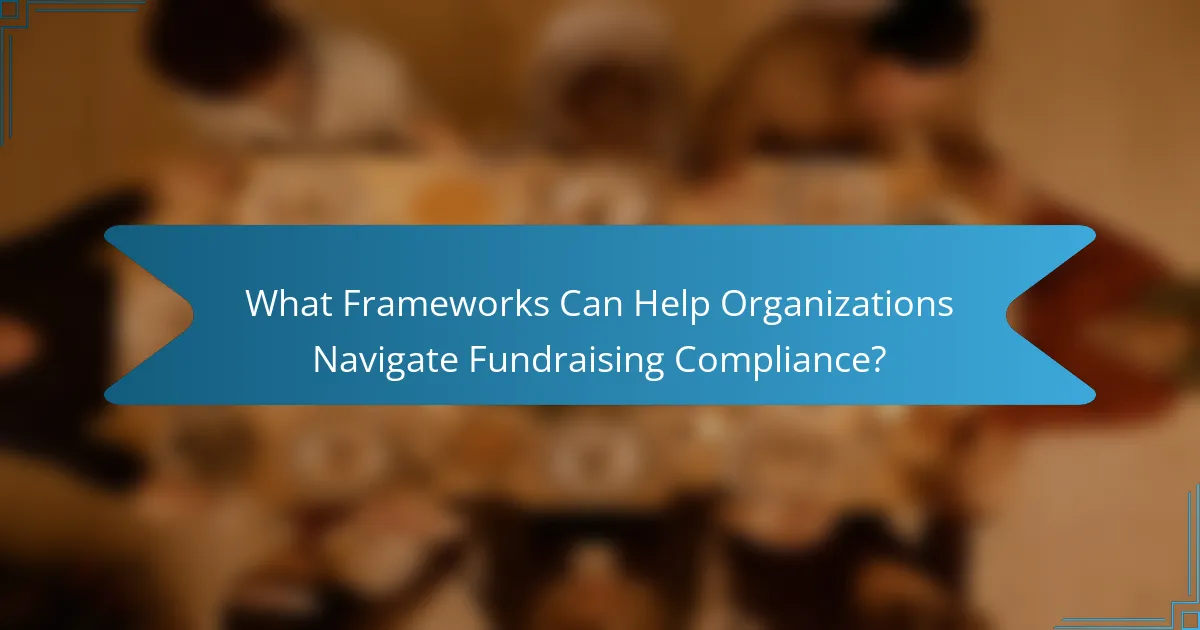
What Frameworks Can Help Organizations Navigate Fundraising Compliance?
Organizations in the UK human rights sector can utilize various frameworks to ensure compliance with fundraising regulations. These frameworks provide structured approaches to manage compliance risks and enhance operational effectiveness.
Compliance Management Systems
Compliance Management Systems (CMS) are essential for organizations to systematically manage their fundraising activities in line with legal requirements. A robust CMS includes policies, procedures, and training programs that help staff understand their obligations under UK fundraising regulations.
Key components of a CMS may involve regular audits, documentation of fundraising activities, and clear communication channels for reporting compliance issues. Organizations should ensure that their CMS is adaptable to changes in regulations and best practices.
Risk Assessment Frameworks
Risk Assessment Frameworks help organizations identify and evaluate potential compliance risks associated with fundraising. By systematically analyzing risks, organizations can prioritize their compliance efforts and allocate resources effectively.
Implementing a risk assessment involves identifying areas of vulnerability, assessing the likelihood and impact of risks, and developing mitigation strategies. Regular reviews and updates to the risk assessment are crucial to address new challenges and ensure ongoing compliance.
